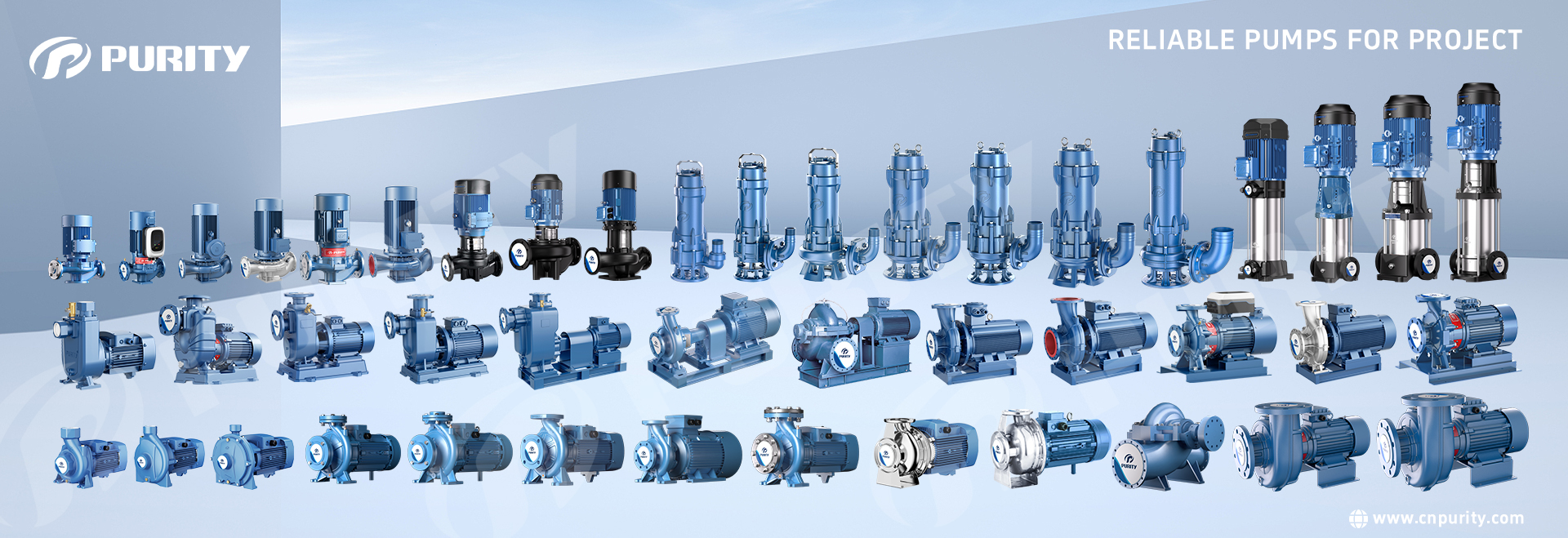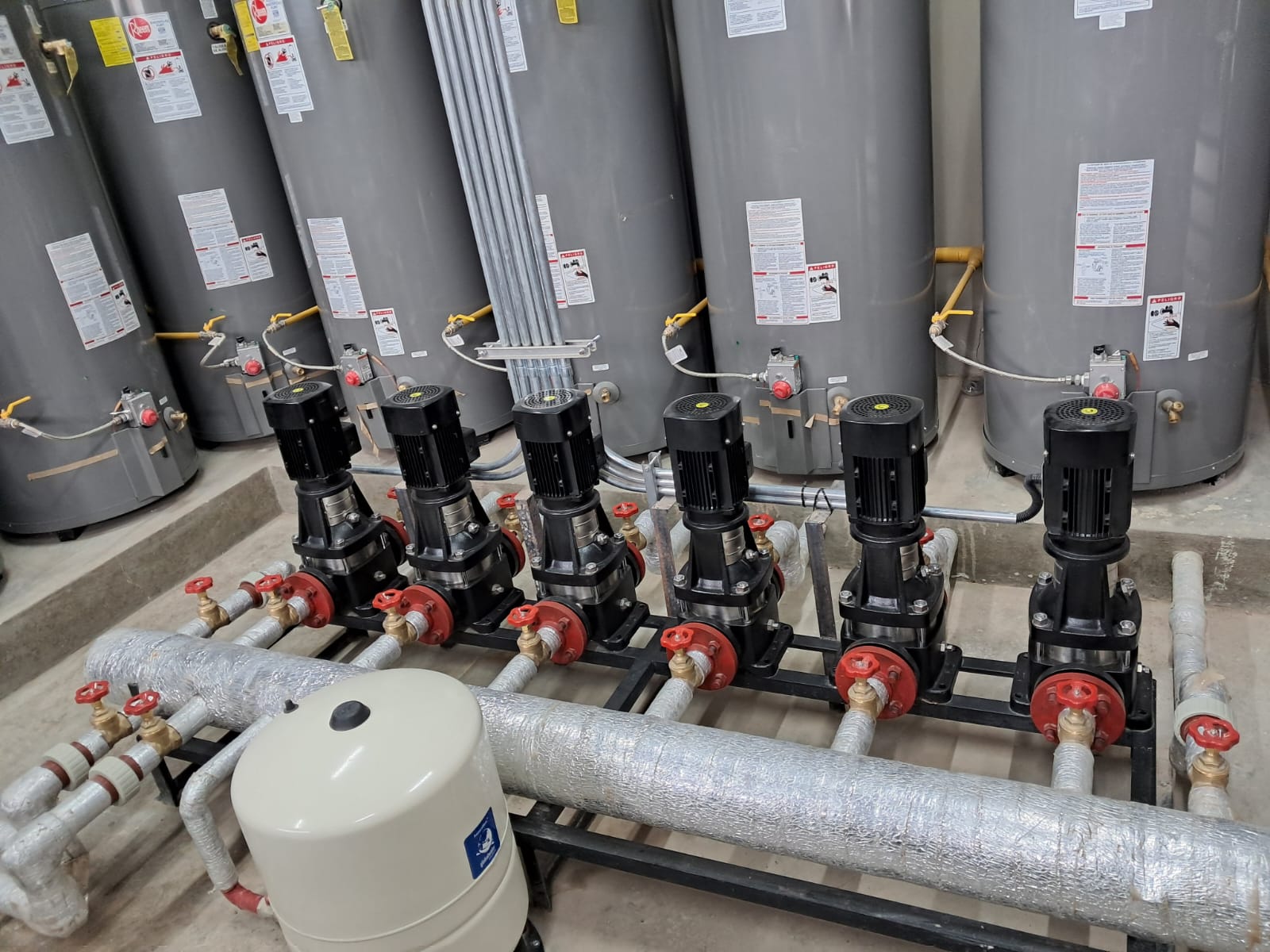A centrifugal pump is one of the most widely used types of pumps in industrial and municipal systems.
By definition, a centrifugal pump uses a rotating impeller to convert mechanical energy into kinetic energy and then into pressure energy, effectively moving fluids from one point to another.
This simple yet efficient mechanism allows the pump to handle large volumes of liquid at steady flow rates.
Because of their simple design, smooth operation, high efficiency, and easy maintenance, centrifugal pumps have become essential in applications such as water supply, wastewater treatment, chemical processing, and energy systems. Their versatility makes them the backbone of countless industrial processes.
Understanding the types of centrifugal pumps is essential to selecting the right model for your specific industrial or municipal application. Each design offers unique performance characteristics tailored to different flow, pressure, and installation requirements.
1.End-Suction Pump
This is the most common centrifugal pump type. It features a single impeller and a straightforward structure, ideal for low-pressure and high-flow applications. These pumps are widely used in HVAC systems, building water supply, and general industrial fluid transport.
2.Split-Case Pump
Split-case centrifugal pumps have a horizontally split casing, allowing easy maintenance and service. They are suitable for high-flow, medium-head applications such as municipal water supply, fire protection, and industrial cooling systems.
3.Vertical Inline Pump
Compact and space-saving, vertical inline pumps are perfect for buildings and commercial systems where space is limited. They are often integrated directly into pipelines for convenient installation.
4.Multistage Centrifugal Pump
Designed with multiple impellers, these pumps are used where high head or high pressure is required. Typical applications include boiler feed, pressure boosting, and reverse osmosis systems.
5.Self-Priming Pump
Self-priming centrifugal pumps are capable of removing air from the suction line, making them ideal for intermittent flow conditions such as wastewater transfer, stormwater drainage, and irrigation systems.
6.Special Designs
Certain environments demand special centrifugal pump types such as vertical turbine pumps, canned motor pumps, and screw-type pumps. These are engineered for handling corrosive, abrasive, or high-temperature fluids.

Picture | Purity Centrifugal Pump Series
Given their robust design and versatility, centrifugal pumps are used in nearly every industrial sector. Below are some of the most common centrifugal pump applications:
Centrifugal pumps are widely used to lift and distribute water for irrigation, spray fertilizers, and transfer liquid chemicals. Their high flow capacity and reliability make them indispensable in agricultural water management.
In municipal and industrial water systems, centrifugal pumps are used for filtration, disinfection, and desalination processes. Self-priming and submersible centrifugal pumps handle raw water, treated water, and wastewater efficiently.
Centrifugal pumps play a critical role in transferring crude oil, cooling fluids, boiler feedwater, and firefighting systems. Their ability to handle both light and viscous liquids makes them ideal for refineries and power plants.
In mining operations, centrifugal pumps are used for slurry transport, dewatering, and washing systems. Their rugged construction allows them to handle abrasive slurries and challenging underground environments.
Ships and naval systems rely on centrifugal pumps for bilge pumping, firefighting, seawater circulation, and fuel transfer. They are also found in military support systems and field water purification setups.
These examples highlight the adaptability and reliability of centrifugal pumps across a wide range of industries.

Picture | Application diagram of Purity Special Vertical Pipeline Pump
Selecting the proper centrifugal pump type directly impacts system efficiency, energy consumption, and service life. Factors such as fluid viscosity, pressure, temperature, and installation space must be considered carefully.
Working with professional pump engineers ensures that every system achieves optimal hydraulic performance and long-term reliability.
Purity Pump offers a complete range of centrifugal pump solutions, including inline pumps, multistage pumps, self-priming pumps, split-case pumps, and end-suction pumps.
With a 60,000 m² independent factory and a professional R&D team, Purity delivers customized solutions to meet global industrial and municipal needs.
Our centrifugal pumps are certified with CE, ISO, and SASO standards, ensuring quality, durability, and international compliance.
Whether your project involves water supply, wastewater treatment, or energy systems, Purity provides reliable and efficient pumping solutions.
In summary, centrifugal pumps are the core equipment of industrial and municipal fluid transport systems.
From irrigation to energy production, their ability to move large volumes of liquid efficiently and reliably makes them indispensable in modern infrastructure.
Understanding what centrifugal pump is, the types of centrifugal pumps, and their industrial applications helps ensure proper selection and performance.
With advanced technology, complete certifications, and professional engineering support, Purity centrifugal pumps stand out as a trusted choice for global clients seeking efficiency, reliability, and long-term value.
If you are looking for high-quality centrifugal pump solutions or considering becoming our global distributor, contact Purity Pump today — your trusted partner in sustainable fluid solutions.